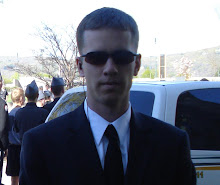New York Times columnist Bob Herbert wrote this piece yesterday, I thought I'd pass it along. And I think he's absolutely right.
While growing up just outside of Chicago, Dennet Oregon dreamed of being an artist. He loved to draw. He enrolled in art school after high school, but then came the attacks of Sept. 11, 2001. He left art school at the age of 19 and joined the Army.
“Sept. 11th was the main reason I joined,” he said, “but there were other underlying reasons as well. I was just poor, and I was tired of being poor. And tuition was kind of high. I called recruiters and we talked about the benefits of the G.I. bill, etc. And I figured, ‘Hey, join the Army and then get out and school would be paid for.’ ”
Mr. Oregon was assigned to the infantry and found that he liked it. He enjoyed the travel, the sense of adventure and the camaraderie with fellow soldiers. He wasn’t crazy about the danger, but, over all, he found the Army agreeable. At the end of four years, he re-enlisted.
“I got hurt March 29, 2005,” he said.
“Got hurt” was an understatement. Mr. Oregon, by then a sergeant, was in the lead truck of a convoy passing through a treacherous village not far from firebase Cobra, in the province of Uruzgan in central Afghanistan.
There was an uneasy feeling in the convoy that bordered on dread. Villagers gathered to stare at the American soldiers. “They stopped what they were doing,” said Sergeant Oregon, “and they were all eyeballing us.”
Everybody in the convoy was thinking I.E.D.: improvised explosive device. As Sergeant Oregon explained, “The road paralleled a river, and between the road and the river was just mud. If you tried to go through the mud, you would only get stuck. So the road was the only way.”
As he recalled the incident during an interview one recent afternoon at his apartment, Mr. Oregon said, “Everybody was scared. I remember saying to my driver, ‘As long as I don’t lose my hands, I’m fine.’ Because I like to draw, you know? ‘As long as I don’t lose my hands.’ ”
Some of the soldiers climbed out of the trucks to hunt for a device. But they didn’t spot anything. The bomb had been buried and paved over with concrete. It was detonated remotely as Sergeant Oregon’s truck passed over it.
A buddy of Sergeant Oregon’s lost his right leg. Sergeant Oregon was the most seriously wounded. He lost both legs. Each was amputated just below the knee. He also suffered a traumatic brain injury, three fractured vertebrae and cuts to his face and head.
There is a strong tendency, in our collective national consciousness, to give short shrift to the many thousands of Americans who are suffering grievously as a result of the wars in Iraq and Afghanistan.
The wars have become like white noise in our culture. They hit the front pages from time to time, and there are evenings when some aspect of the wars are featured on the national news telecasts. But we have no real sense of the extraordinary sacrifices that have been made by the young men and women who are fighting these wars in our name.
The agony for many of the wounded has been all but unbearable — those who have lost limbs or been paralyzed or horribly burned, or who lost their hearing or eyesight.
The suffering extends to the families and loved ones of the wounded, and in all too many cases will last throughout their lives. These are peculiar wars in that the impact on the warriors inevitably is profound, while the effect of the wars on most other Americans is minimal.
There is something shameful — dishonorable — about relegating these warriors to the background. We sent them into hell and we owe them, at the very least, our grateful acknowledgement of their tremendous efforts and boundless sacrifices. There is no way to do that without paying serious attention to them.
Dennet Oregon, who now walks with prosthetic legs and works in an office at the Pentagon, is but one of many wounded soldiers piecing their lives back together after their encounters with catastrophe.
During a recent visit to the Walter Reed Army Medical Center, I spent some time in the Military Advanced Training Center, a remarkable facility where dozens of recent amputees — under the guidance of an extraordinarily talented and dedicated staff — were engaged in the arduous task of physical rehabilitation.
Nearly 1,000 service members have lost limbs as a result of the two wars, and nearly 200 have lost more than one limb. More than 17,000 G.I.’s serving in Iraq or Afghanistan have suffered wounds so serious that they could not be returned to duty.
These wounded service members, many of them quite young, deserve much more of our awareness and support than they are getting.

You are tugging at my wanna-be-chaplain heart strings.
ReplyDelete